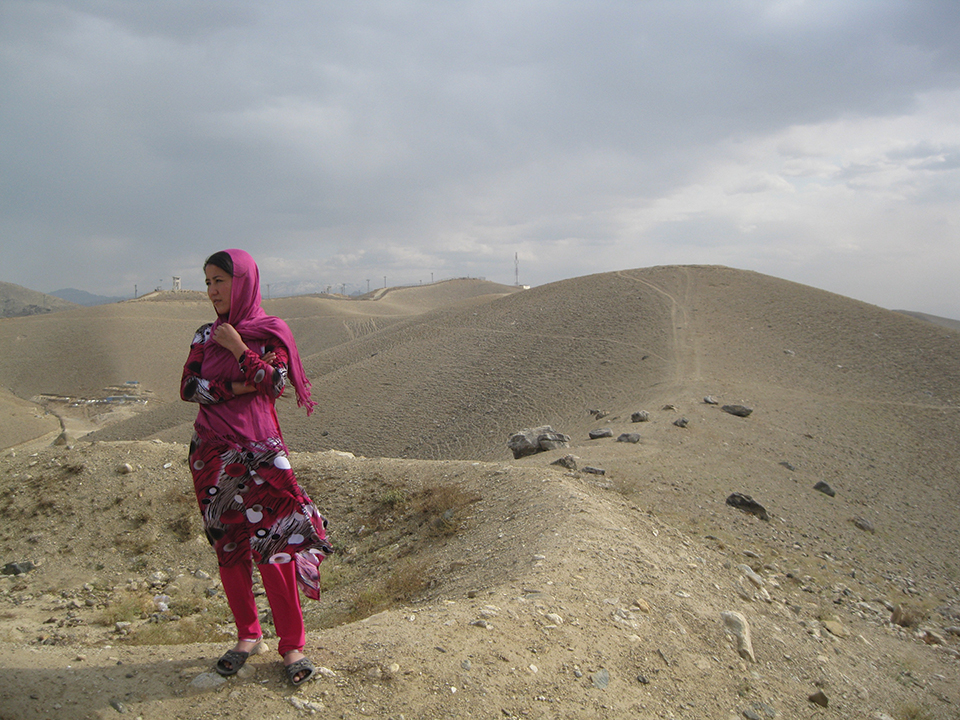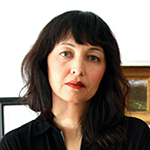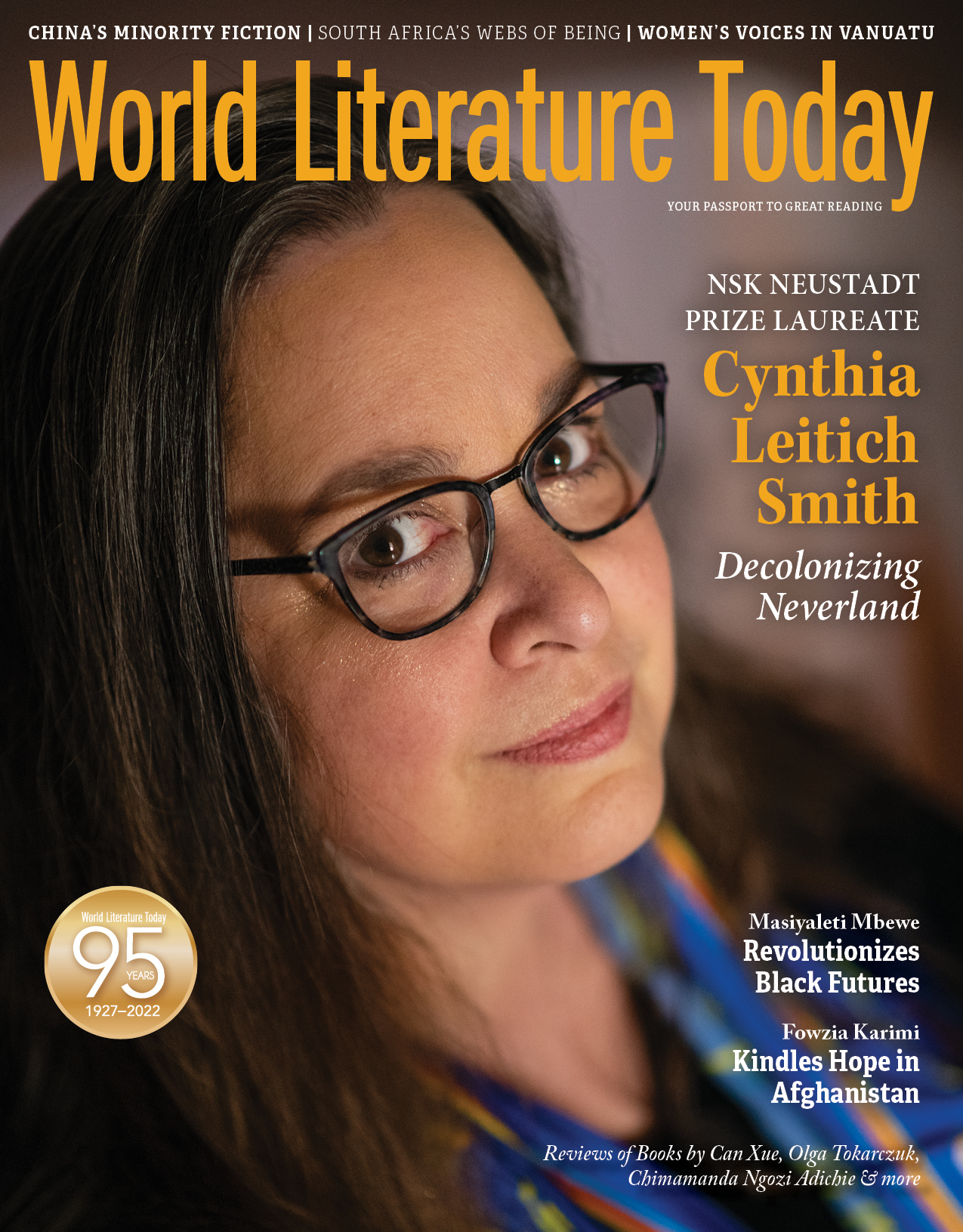Hope, That Small Flame in a Dark Room in Afghanistan

An Afghan American writer recalls her own departure from Afghanistan in 1980 and the weariness she observed on a 2015 visit back to Kabul. Now, having watched events unfold as Kabul fell again, Fowzia Karimi wonders whether the hope she observed while visiting—tenuous though it was—has since been extinguished.
I was six years old when the Soviets invaded Afghanistan. Overnight, Kabul was transformed from a bustling city to a silent prison yard as tanks and soldiers lined its streets and an ominous cloud settled over the city. We were free one moment, occupied the next. I was a child one moment and caught in a nightmare the next. A palpable panic and terror filled the city, though its occupants moved about silently and gingerly. Fear permeated every action, every spoken word. From what I remember, the bombings and disappearances began immediately. And each day brought a new horror, a new loss. Our world contracted. Our reality was turned upside down. In my immediate family, it was my father whose life was imminently in danger; he worked at the US Embassy. All around him, his family, friends, and colleagues were disappeared, tortured, dismembered, buried alive. It was only a matter of time before they came for him. We were some of the fortunate few who were able to escape early in the war. My parents, my four sisters, and I immigrated to the US and settled in California. We’d escaped danger, but the war clung to us and shaped our lives and outlook moving forward.
We’d escaped danger, but the war clung to us and shaped our lives and outlook moving forward.
Throughout my life, I’ve come back to this sentiment: how fortunate we were to leave when we did. What followed our escape was another forty years of brutal violence as one after another force, most foreign or foreign-funded, vied for control of Afghanistan. The war we briefly experienced was the first in a relentless series of wars and occupations. Since then, multiple generations have been born into war, suffering one occupation, one famine, one bombing, one loss after another, never knowing peace. As the years advance, I think how fortunate I am to have had a glimpse of a peaceful Afghanistan. I came to the US with memories of those first peaceful years of my life intact. My cousin who recently joined the Afghan military had no such memories when he was killed by the Taliban a few months ago. As a small child, he lost his own father to a rocket strike. His entire life was shaped and circumscribed by war. Yet he fought for peace.
As I watch events unfolding in Afghanistan today, I feel the same helplessness I have felt all my life. I suffer the keen devastation and heartbreak I’ve come to know too well across these four decades of my life as an Afghan American. Here is yet another chapter in Afghanistan’s long and relentless history of war. Here is Kabul falling again. Innocent Afghans are fleeing their homes and towns, losing their livelihoods and the precious few freedoms they’ve worked so hard to achieve, and are now left to the whims of a barbaric terrorist group. Similar scenes of chaos, violence, desperation, and utter terror have played out numerous times over these many decades. As I helplessly watch, my heart breaks for all Afghans, and it breaks in particular for the women and girls of the country. Their lives have never been easy. But a return to Taliban rule means one thing for Afghan women: their complete erasure. Through violence, through forced marriage, from the schoolroom, from the public sphere, women and girls will be erased.
As I watch events unfolding in Afghanistan today, I feel the same helplessness I have felt all my life.
In 2015 I visited Kabul for the first time since leaving in 1980. My father, my two younger sisters, and I returned to commemorate the first anniversary of my mother’s passing with her two sisters and their extended families in Kabul. The Taliban had recently seized control of Kunduz. Waves of suicide attacks and bombings in Kabul had killed scores of civilians. The US State Department strongly advised that we cancel our trip. But we feared that the situation in Afghanistan, always unpredictable, could further deteriorate and we could lose this one opportunity to return. My father, mourning my mother’s loss, was further burdened with the fear that he was taking his daughters back to the inferno he’d saved them from decades before. And on some level, we all feared we might be caught there as parts of the country, including my father’s village in the north, fell into the hands of the Taliban.
Kabul was a shell of what it had been. In the intervening years, it had suffered the Soviet invasion, a civil war, the first Taliban takeover, and the American occupation. We stayed with my oldest cousin in a house that had once belonged to my grandmother. Nearby was our old house, a house my father, with great pride, had partly built himself. It stood dilapidated and lifeless, seemingly unoccupied. The garden he had lovingly tended was long dead. In fact, we came across little greenery anywhere in the city; its citizens faced more basic and pressing concerns. My grandmother’s house was much smaller than I remembered it, but its street-facing courtyard walls had been built to at least twice their original height for security. Kabul was now a city of humble fortresses, the towering walls of family homes and businesses topped with glass or barbed wire.
Several branches of my mother’s extended family were living in Kabul in 2015. They had returned to the country after the fall of the Taliban to the US in 2001. They’d lived through the Soviet occupation and even the devastating civil war. But the brutality of Taliban rule was something else entirely. Those who could escaped to nearby Pakistan and India, where they lived as refugees. The multigenerational family that escaped to Pakistan was supported by two of its women, one a doctor, the other a nurse. These two women built a makeshift clinic out of their home, treating women and girls, delivering babies, while caring for their own families. When the Taliban retreated years later, the family returned to Kabul. My cousin, the physician, resumed her work at one of Kabul’s main hospitals, going on to lead its oncology department.

During my trip, I sensed two things above all others. First was a weighty and deep weariness. Afghans of all ages, those who’d known peace before the Soviet invasion, and those whose experience of life had always been a shifting war, were all worn down by decades of violence and loss, and by the daily terror and unpredictability of war. Their children went to school not knowing whether a suicide bombing or a kidnapping might end their day. The young women with jobs or in college had to be accompanied to these places by the men in their families. Inside their home fortresses, they shed extra layers of clothing and hair coverings. But as soon as they stepped out, they were covered from head to foot and always accompanied by male relatives. As we went about the city, I saw very few women and girls. The large majority of people in the streets, taking buses, shopping, running businesses, were men. Though the Taliban had formally retreated years before, their presence, and fear of them, was still palpable. They’d left a deep mark on Afghans who continued to abide by the strict laws of their extremist form of Islam. And, of course, the Taliban continued to terrorize the country by bombing schools, kidnapping aid workers, killing journalists. During our third and final week in Kabul, a blast woke me in the middle of the night. I stayed up for a while, wondering if the rest of the household would react, and remembered the Soviet bombings from my early childhood. The next morning, weary but indifferent, my cousin’s wife told me it was another bombing, this one just down the hill from their house. She sent her children to school, as usual.
This weariness was most evident in one of my cousins. He’s a few years older than I am, but I’m not sure that he could recall his peaceful childhood in Afghanistan. He seemed to carry every year of the war, every death, every bombing in his thin and tired frame. He’d also escaped the Taliban and lived in Pakistan for a time. Upon returning to Kabul, he was able to reclaim his family home, which had been requisitioned and occupied by the Taliban. The house had seen a great deal of damage and he spent years fixing it as funds and materials became available. Two months before our arrival in Kabul, a large bomb was dropped (they didn’t know by whom) in his neighborhood, about a quarter of a mile from his house. The bomb demolished the buildings in its immediate vicinity and caused damage much farther away. We drove past the massive crater in the street on our way to his house. He showed us the work he’d recently done to brace parts of the house and to fill and paint over the many large cracks in its walls.

But a return to Taliban rule means one thing for Afghan women: their complete erasure.
A week later, Kabul experienced a 7.5 magnitude earthquake, the largest in its recorded history. (I was in a taxi driving near the US Embassy. As scores of people came flooding out into the streets, yelling and panicked, I assumed it was a suicide bombing.) On our next visit, my cousin showed us how the earthquake had wiped out years of work and further damaged his unstable house. It was hard not to see his house as an analogue of his person. A lifetime of living with war had frayed his nerves to such a degree that he couldn’t hold down a job. His most recent job was that of a taxi driver, but the traffic in Kabul, chaotic at the best of times, caused severe panic attacks. His anxiety was palpable, almost electric, and never waned. He spoke of being a broken man, shattered by decades of war, of instability, of living in poverty. I have faint memories of him as a cheerful, energetic, and adventurous boy.
Our aunts recalled their childhood and youth, told us stories about our mother, and for brief moments were transported by their own happy memories. They were now mothers and grandmothers and consumed with caring for their families, welcoming newborns, planning a wedding. But the years of war showed on them too; life had been and continued to be hard. To show us something of the Kabul that had once existed, the older of my two aunts took us to the one place in the city where women could walk freely and safely. Bagh-e-Zanana, the Women’s Garden, was an enclosed manicured park that only allowed female visitors. It was the one outdoor space where women could get exercise, picnic, and sit together without having to worry about the male gaze, harassment, or worse. I felt a peacefulness and lightness there that I hadn’t felt in any other public space.
In the company of women alone, Afghan women were not shy about sharing stories on the plight of females in the country. I was told about women bleeding to death during childbirth because their husbands would not allow them to go to the hospital where male doctors or nurses might treat or see them. There was also the belief among these men that delivery by cesarean tainted or dirtied their wives. One woman who, through marriage, intimately knew the culture of a carpet-weaving village in the far north, told me that girls and women there were no more than slaves to their men. A girl is taught to weave beginning at the age of three. Her days are spent weaving from morning to night. At ten to twelve years of age, she is sold into marriage to boys thirteen to fifteen years old, or sometimes much older, including to old men. Once married, she continues to weave for her husband every day of the year. She cannot eat before her husband and, in fact, is only allowed his leftovers. A married girl/woman who loses her husband is sent back to her parents while her children are kept by her late husband’s family. She is next sold for a lower price as a second or third wife to another man.
The woman who told me these stories had her own to tell. As a girl she had loved school. She excelled in her studies and had plans to study medicine. But when the Taliban took over the country, her parents pushed her into marriage with the son of family friends. This was done for her own safety; the Taliban routinely took and married these girls themselves. She soon had children of her own. Years later she still mourned the loss of her education, her youth, and her autonomy.
In a small village on the outskirts of Kabul, I met a mother and daughter who’d recently found themselves facing the same dire future—that of a discarded wife. The daughter, a sweet, shy nineteen-year-old, shared her story haltingly and with embarrassment. In the year and a half she’d been married, she’d not been able to conceive, and her husband was currently threatening to kick her out and to marry an even younger girl in her place. I sensed that what kept him from following through was that she supported the two of them with the bread she baked and sold out of their small house. Her mother, a woman in her sixties now living with her brother in the village, had been recently kicked out of her house. Her husband of forty-plus years told her he no longer had use for her and, having come into money, purchased a young wife for himself.
This was hope, a quiet and tenuous hope for peace and for normalcy, brightest in the youngest generations.
The second thing I sensed during my time in Kabul was much less visible than the weariness and was akin to a small flame in a dark room. This was hope, a quiet and tenuous hope for peace and for normalcy, brightest in the youngest generations. It was an incredible and beautiful thing to see. Despite the uncertainty of their daily lives, the lack of physical and financial security, they had hope for a brighter future for themselves in Afghanistan. This was most apparent in their pursuit of an education. And it was apparent in their personal dreams for their individual futures, whether a business, a career, a family, or a car. Parents wanted what they themselves had missed out on for their children. And children dreamed of a free and vibrant Afghanistan in their futures. As I read and watch the news today, I wonder if this flame has been extinguished for those who had tended it and kept it burning in their hearts and imaginations. I wonder what this dark new chapter brings, what suffering, what terror, what losses for a population already wearied and battered by endless war.
Denton, Texas












